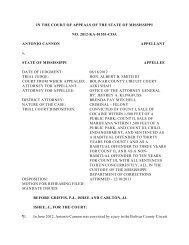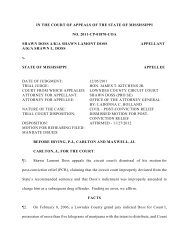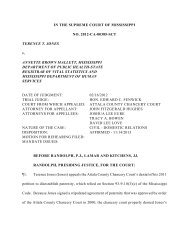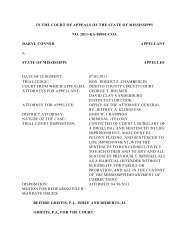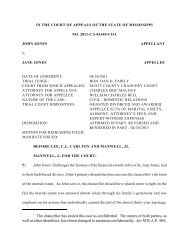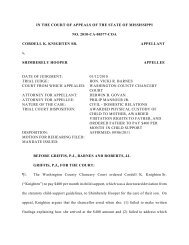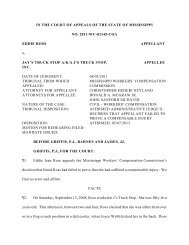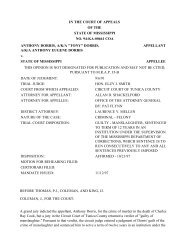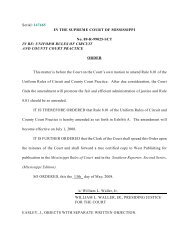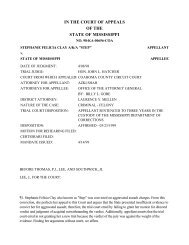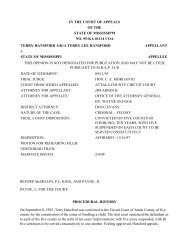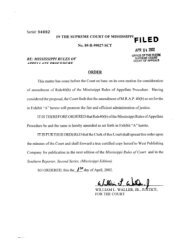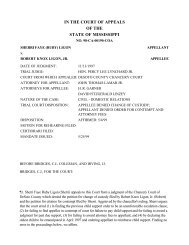intown lessee - Mississippi Supreme Court
intown lessee - Mississippi Supreme Court
intown lessee - Mississippi Supreme Court
Create successful ePaper yourself
Turn your PDF publications into a flip-book with our unique Google optimized e-Paper software.
IN THE SUPREME COURT OF MISSISSIPPI<br />
NO. 2009-CA-01987-SCT<br />
INTOWN LESSEE ASSOCIATES, LLC; INTOWN<br />
LESSEE SERVICES, LLC; IT TENANT RBS, LLC;<br />
AND TIMOTHY TUCKER<br />
v.<br />
MICHAEL KEITH HOWARD, INDIVIDUALLY,<br />
AND SHANNON POOLE, INDIVIDUALLY<br />
DATE OF JUDGMENT: 09/25/2009<br />
TRIAL JUDGE: HON. TOMIE T. GREEN<br />
COURT FROM WHICH APPEALED: HINDS COUNTY CIRCUIT COURT<br />
FIRST JUDICIAL DISTRICT<br />
ATTORNEYS FOR APPELLANT: WILLIAM ‘TREY’ JONES, III<br />
JOSEPH ANTHONY SCLAFANI<br />
ATTORNEYS FOR APPELLEE: JAMES ASHLEY OGDEN<br />
JAMES W. SMITH, JR.<br />
WENDY MICHELLE YUAN<br />
NATURE OF THE CASE: CIVIL - PERSONAL INJURY<br />
DISPOSITION: AFFIRMED - 06/30/2011<br />
MOTION FOR REHEARING FILED:<br />
MANDATE ISSUED:<br />
EN BANC.<br />
KITCHENS, JUSTICE, FOR THE COURT:<br />
1. Michael Howard and Shannon Poole were awarded a four-million-dollar jury verdict<br />
1<br />
against InTown, an extended-stay motel, for injuries each sustained as victims of an armed<br />
1<br />
InTown Lessee Associates, LLC, InTown Lessee Services, LLC, IT Tenants RBS,<br />
LLC, and Timothy Tucker will collectively be referred to as “InTown.”
obbery in the motel. Aggrieved, InTown appealed. Finding no error, this <strong>Court</strong> affirms the<br />
trial court’s judgment.<br />
Facts<br />
2. Michael Keith Howard and Shannon Poole had rented a room at InTown in June 2008,<br />
where the couple temporarily resided while waiting for a home to become available in<br />
Belhaven, a residential area in Jackson, <strong>Mississippi</strong>. On June 27, 2008, at approximately<br />
9:30 p.m., Howard left the motel room to take his dog for a walk. As he was returning to the<br />
room, three men burst through the door, demanded money from the couple, and ransacked<br />
the room. One of the assailants hit Howard in the face with a hand gun, then pointed the gun<br />
at Poole’s head and demanded money. Howard and Poole denied having money in the room.<br />
Undeterred, one of the assailants flipped the mattress off the bed, while Poole was on top of<br />
the mattress, causing her to be pushed against a wall. The men found between $700 and<br />
$900 under the mattress. The assailants took the money, Howard’s and Poole’s drivers’<br />
licenses, and Poole’s cell phone. Following the altercation, Howard and Poole were treated<br />
for various injuries that each had sustained during the attack. Initially, Howard was treated<br />
for broken bones in his face and numerous contusions and lacerations to his body. Prior to<br />
trial, Howard had to undergo facial reconstructive surgery. Poole sustained contusions and<br />
bruises in the attack, followed by soreness and severe psychological damage. Howard and<br />
Poole were under the continuing care of physicians and psychiatrists. No arrests were made<br />
in connection with the armed robbery and physical assaults.<br />
3. Howard and Poole filed their joint complaint against the defendants on July 18, 2008,<br />
alleging: (1) that they were invitees of InTown; (2) that they were seriously injured because<br />
2
the defendants had failed to fulfill their joint, several, and collective duties to use reasonable<br />
care and to take adequate and reasonable security precautions or measures to protect invitees<br />
of InTown, including the plaintiffs, from foreseeable harm and danger, including the harm<br />
suffered by Plaintiffs; (3) that, before June 27, 2008, InTown knew or should have known<br />
that it had inadequate security, that strangers, trespassers and loiterers frequently came onto<br />
its property, that the wooden fence surrounding part of its property was in disrepair, that the<br />
locks on the guest room doors were not working properly, and that the property was not<br />
reasonably safe; (4) that InTown had failed to remedy or repair the unsafe conditions and<br />
inadequacies of the property; (5) that InTown had a duty to the plaintiffs to make sure that<br />
the facilities, including all common areas, as well as guest rooms, were secure, safe, and fit<br />
for their particular purposes, that reasonable security measures were provided and<br />
maintained, that the property, including the fences surrounding part of the property and the<br />
locks on all guest room doors, were properly maintained, and that general upkeep of the<br />
property was performed; (6) that InTown had specific control and authority to make<br />
management decisions material to the personal safety and security of the plaintiffs; (7) that<br />
InTown had specific control and authority to make management decisions pertaining to the<br />
hiring, firing, and suspension of employees or security at the motel; (8) that InTown’s agents<br />
and/or employees had warranted and/or covenanted that the property where Howard and<br />
Poole were staying as invitees was secure, safe, fit for its particular purpose, properly<br />
maintained, under proper upkeep, and reasonable security measures were provided and<br />
maintained for the plaintiffs, that security would be adequate to both protect the room where<br />
the plaintiffs were staying, as well as control and maintain the property and enforce security<br />
3
procedures, including but not limited to stopping loiterers and trespassers from entering the<br />
property and/or removing trespassers and loiterers from the property; (9) that InTown had<br />
failed to provide adequate first aid to the plaintiffs and had failed to instruct its employees<br />
on providing first aid to the plaintiffs; and (10) that InTown had failed to warn Howard and<br />
Poole of the atmosphere of violence that existed on and around the property, had failed to<br />
provide notice of the prior crimes occurring on and around the property, and had failed to<br />
warn the plaintiffs of the previous assaults and robberies occurring on and around the<br />
property.<br />
4. Trial commenced on September 21, 2009, and the jury returned a general verdict in<br />
favor of Howard and Poole on September 23, 2009.<br />
5. Numerous Jackson police officers testified at trial regarding calls for service at<br />
InTown. One officer had been called to InTown Suites as many as thirty times to respond<br />
to “armed robberies, auto burglaries, car jackings, just auto thefts; different things of that<br />
nature . . . primarily major crimes.” The officer had advised the manager of InTown that the<br />
crime problem on the property could be eliminated by hiring professional security.<br />
6. A lieutenant with the Jackson Police Department testified that “InTown Suites . . . had<br />
a number of problems on their property. Specifically they’ve had robberies. They’ve had<br />
burglaries. Cars have been stolen. There’s prostitution, drugs on the property; just anything<br />
you can think of.” The lieutenant testified that he was “advised that [InTown] had a courtesy<br />
officer. He was not a security officer, nor a security guard . . . . [T]he difference is a<br />
courtesy officer, he was not armed and was not properly trained to handle any type situations<br />
that would come up. He was only to call the police . . . if he saw something there on the<br />
4
property criminal in nature.” The lieutenant also testified that he had told the manager of<br />
InTown that off-duty officers “would be more than willing to come out there and work off<br />
duty after we got off work to patrol the property . . . .” The lieutenant further testified that<br />
he had instructed the manager that InTown should be informing its customers of the problems<br />
that had been occurring on the property, and that the manager had indicated that InTown<br />
would have no customers if such a warning were given.<br />
7. Another officer testified that he was a part of the “delta strike force,” which the<br />
Jackson Police Department had formed in an effort to deter crimes along the Interstate 55<br />
corridor. He testified that InTown Suites was a target area that the delta strike force was to<br />
patrol. He explained that the delta strike force’s duty was to “go through [InTown’s] parking<br />
lot, make sure there was no cars broke into, no illegal happenings on the streets or on the<br />
property itself. Mostly we were there to try to answer calls and be quick as possible in<br />
responding to calls that may happen at InTown Suites or other locations.” He also testified<br />
that, when the task force was on InTown property, no criminal activity transpired. He further<br />
testified that he had informed the manager of InTown that there was a crime problem on its<br />
property and that “they should try to go ahead and get a professionally trained security<br />
service” to solve the crime problem on the property.<br />
8. Charles Campbell, the property manager of InTown Suites in Jackson on the date that<br />
Howard and Poole were attacked in their room, testified that one of InTown’s duties was “to<br />
ensure that customers were provided adequate protection from crime that would occur on the<br />
property.” He also testified that he was in contact with his regional manager on a daily basis<br />
and that he often informed regional and corporate officials that there was a crime problem<br />
5
at the Jackson property. Campbell testified that he had asked his regional manager to provide<br />
security at the Jackson location of InTown Suites on more than one occasion, and that the<br />
regional manager always had told him that InTown had insufficient funds to hire armed<br />
security.<br />
9. Several expert witnesses also were called to testify. Kenneth Goodrum, a commander<br />
with the Jackson Police Department, was accepted without objection as a plaintiffs’ expert<br />
“in the area of security with emphasis in the area of premises.” Commander Goodrum<br />
testified that he had reviewed “all the documentation and the evidence that was given to<br />
[him,] as well as the depositions and offense reports” in this case. Commander Goodrum had<br />
completed a crime history report of the Jackson location of InTown, and was able to<br />
determine that, in the two-and-a-half-year period prior to Howard and Poole’s injuries, “eight<br />
armed robberies, 32 auto thefts, 55 auto burglaries, six hold-up alarms, 15 simple assaults .<br />
. . three armed robberies of businesses, four men with a gun, two vandalisms, 48 disturbances<br />
and 12 threats” had occurred on the property of InTown. Without objection, Commander<br />
Goodrum testified that the assault of Michael Howard and Shannon Poole “was preventable.<br />
And my opinion is that if they would have hired off-duty police officers or armed security<br />
guards to patrol that parking lot and patrol their property, it would have been able to be<br />
prevented.”<br />
10. Plaintiffs deposed David Groves, a regional director of operations for InTown.<br />
Groves testified that approximately twelve InTown properties have armed security on the<br />
property, and that the decision to provide armed security guards at a particular property is<br />
decided on a case-by-case basis. Groves said that the general manager would have to request<br />
6
that armed security be provided, and then the decision to provide security personnel would<br />
be up to InTown’s corporate officials. Part of Groves’s deposition was read into the record<br />
at trial. InTown objected, but the trial court reasoned that “it still is a part of that testimony<br />
which shows notice with reference – and it goes to the issue of foreseeability, which is an<br />
issue in this case. And I think it probably deals with the issue of security in its entirety. As<br />
such, I’m going to allow the testimony with reference to . . . Groves.”<br />
11. The plaintiffs offered an economist, who testified regarding Poole’s claim for future<br />
loss of wages. The economist opined that Poole’s future loss of income ranged from<br />
$574,209 to $1,922,589. InTown did not object at trial to the testimony or methodology of<br />
the economist. Dinesh Goel, M.D., a board-certified general surgeon and accepted expert<br />
in the fields of general surgery and family medicine, testified at trial. Dr. Goel had treated<br />
both Howard and Poole for their injuries sustained after being attacked at InTown. Dr. Goel<br />
testified that Howard was treated for a fractured cheek bone and orbit bone of his left eye,<br />
which required multiple surgeries. Dr. Goel did not perform Howard’s surgeries; however,<br />
he had reviewed the surgical records. Dr. Goel further testified that Howard would need<br />
additional surgeries to correct those injuries completely. Dr. Goel said that the estimated cost<br />
of Howard’s future surgery would be between $5,000 and $8,000.<br />
12. Dr. Goel testified that, in addition to Howard’s badly broken cheek bone and orbit<br />
bone, he had suffered a broken jaw, a head injury, and a bulging disk. Additionally, Howard<br />
had suffered post-traumatic stress disorder as a result of the attack at InTown. As a result of<br />
his injuries and post-traumatic stress disorder, Howard had headaches, nightmares, sleep loss,<br />
and exhibited symptoms of depression, for which Dr. Goel had referred Howard to a<br />
7
psychiatrist for treatment. Dr. Goel further testified that he did not “expect [Howard’s<br />
symptoms] to get cured, but they’re going to wax and [wane]. They’re going to get better<br />
at times, they’re going to get worse at times, but he’s going to live with it.”<br />
13. Regarding Dr. Goel’s future treatment of Howard, he testified that Howard would<br />
“need a follow-up on a monthly basis and even quarterly later on,” and that the cost of that<br />
treatment would be approximately $3,000 to $4,000 per year, plus the cost of medications.<br />
14. Dr. Goel testified that Poole had suffered head, back, and neck injuries as a result of<br />
being attacked at InTown on June 27, 2008. He said that he initially had treated her with<br />
pain medications, and later referred her to a psychiatrist for treatment of her post-traumatic<br />
stress disorder, headaches, nightmares, and sleep loss. Dr. Goel said that Poole would need<br />
to have medical follow-ups on a regular basis, and that the future cost of her medical care<br />
would be approximately $1,000 to $2,000 per year. Further, Dr. Goel said that her condition<br />
is “going to wax and [wane], but it’s not going to go away. It’s been more than a year she’s<br />
been hurting and suffering with it. I think she’s going to stay with it.”<br />
15. Krishan Gupta, M.D., a psychiatrist, treated Howard and Poole for post-traumatic<br />
stress disorder. Dr. Gupta testified that his initial diagnosis of Howard was “adjustment<br />
disorder and acute stress disorder. As time progresses, we can find the signs and symptoms<br />
of post traumatic stress disorder. And we gave a diagnosis of post traumatic stress disorder.”<br />
Dr. Gupta also testified that Howard was “doing a little better, but still needs continuous<br />
psychotherapy and medication management.” Dr. Gupta further testified that post-traumatic<br />
stress disorder “is a psychological scar in the brain. This will not go away. It’s not a<br />
8
physical injury you can see like [Howard’s] face was reconstructed, but psychological cannot<br />
be. So they’re going to be there as long as [Howard] is living on this earth.”<br />
16. Dr. Gupta said that “in the initial evaluation [Poole] was very anxious, so I gave her<br />
a diagnosis of acute stress disorder. As the time progressed as we understand more about<br />
[Poole], we gave a diagnosis of post traumatic stress disorder later on.” Dr. Gupta said that<br />
Poole had suffered from panic attacks, but that most of the panic attacks were from her post-<br />
traumatic stress disorder. Further, Dr. Gupta testified that Poole was “not making much<br />
progress. She needs more counseling, and she needs more intensive therapies which will<br />
help her to come out and function like [Howard] is doing right now. [Howard] is holding a<br />
job at this time. [Poole] is not able to do that at this time at all.” He also said that Poole<br />
would need continued treatment with medication.<br />
17. Dr. Gupta testified that, over the lifetime of both Howard and Poole, the cost of each<br />
individual’s psychiatric treatment would be, at a minimum, $500,000.<br />
18. At the close of the plaintiffs’ case-in-chief, InTown rested without presenting<br />
evidence. The jury returned a general verdict in the amount of $2,000,000 for Howard and<br />
$2,000,000 for Poole.<br />
Issues<br />
19. On appeal, InTown raises the following issues:<br />
I. Whether the trial court erred in denying InTown’s motion for directed<br />
verdict and motion for JNOV.<br />
II. Whether InTown owed a duty to Plaintiffs to warn them of the alleged<br />
generalized “atmosphere of violence” on and around the Jackson<br />
property.<br />
III. Whether the cumulative effect of the admission of irrelevant and<br />
inadmissible evidence was highly prejudicial to InTown.<br />
9
IV. Whether the trial court erred by refusing InTown’s comparative<br />
negligence instructions.<br />
V. Whether the trial court failed to comply with the statutory cap on<br />
noneconomic damages; alternatively, whether the trial court erred in<br />
denying InTown’s request for remittitur.<br />
Discussion<br />
I. Whether the trial court erred in denying InTown’s motion for directed verdict and<br />
motion for JNOV.<br />
20. At the close of all of the evidence, InTown moved for a directed verdict on the issue<br />
of causation. InTown began its argument with the following statement: “I realize the<br />
plaintiffs have established a duty was owed, and that’s admitted. But I believe the plaintiffs<br />
have failed to establish . . . that regardless of security that was present or regardless of any<br />
actions that were taken, the plaintiff failed to show that any additional security or any<br />
additional acts could have prevented the event from happening.” The trial court denied<br />
InTown’s motion for directed verdict. InTown filed a post-trial “Motion for Judgment<br />
Notwithstanding the Verdict, or in the alternative, Motion for a New Trial, or, in the<br />
alternative, Motion for a Remittitur and/or Motion to Amend the Verdict,” arguing that “[t]he<br />
jury’s verdict reflected a finding that the alleged inadequacy of security was the proximate<br />
cause of the Plaintiffs’ [injuries]” because “the evidence presented at trial failed to establish<br />
that this alleged inadequate security was the sole cause of the subject incident.” The trial<br />
court denied InTown’s post-trial motion.<br />
21. On appeal, InTown argues that Howard and Poole “failed to meet their burden to<br />
establish that the proximate cause of their assault was the failure of InTown to employ an<br />
armed, off-duty JPD officer to provide security at the Jackson property.” InTown argues that<br />
10
the plaintiffs “were required to proffer sufficient evidence to establish that the failure of<br />
InTown to employ an armed, off-duty JPD officer was a substantial factor in bringing about<br />
their injuries, and had InTown employed an armed, off-duty JPD officer the harm would not<br />
have occurred.” Further, InTown alleges that “[t]he only record evidence on the issue of<br />
whether InTown’s failure to employ an armed, off-duty officer was the proximate cause of<br />
Plaintiffs’ assault is the conclusory statement of Plaintiffs’ proffered ‘expert’ JPD Officer<br />
Kenneth Goodrum.” InTown argues that the plaintiffs failed to meet that burden; therefore,<br />
it was entitled to a judgment notwithstanding the verdict. We disagree and affirm the trial<br />
court on this issue.<br />
22. “The standard of review for the denial of a motion for a judgment notwithstanding the<br />
verdict (JNOV) is de novo.” U.S. Auto. Ass’n (USAA) v. Lisanby, 47 So. 3d 1172, 1176<br />
(Miss. 2010) (citing U.S. Fid. and Guar. Co. of Miss. v. Martin, 998 So. 2d 956, 964 (Miss.<br />
2008)). “A motion for JNOV is a challenge to the legal sufficiency of the evidence, and this<br />
<strong>Court</strong> will affirm the denial of a JNOV if there is substantial evidence to support the verdict.”<br />
Adcock v. Miss. Transp. Comm’n, 981 So. 2d 942, 948 (Miss. 2008) (citing Johnson v. St.<br />
Dominics-Jackson Mem’l Hosp., 967 So. 2d 20, 22 (Miss. 2007)). “This <strong>Court</strong> will consider<br />
the evidence in the light most favorable to the appellee, giving the party the benefit of all<br />
favorable inference[s] that may be reasonably drawn from the evidence.” Spotlite Skating<br />
Rink, Inc. v. Barnes ex rel. Barnes, 988 So. 2d 364, 368 (Miss. 2008) (quoting Ala. Great<br />
S. R.R. Co. v. Lee, 826 So. 2d 1232, 1235 (Miss. 2002)). “In essence, judgments as a matter<br />
of law present both the trial court and the appellate court with the same question – whether<br />
the evidence, as applied to the elements of a party’s case, is either so indisputable, or so<br />
11
deficient, that the necessity of a trier of fact has been obviated.” USAA, 47 So. 3d at 1176<br />
(quoting White v. Stewman, 932 So. 2d 27, 32 (Miss. 2006)). “[T]his <strong>Court</strong> applies the same<br />
standard of review as it applies when reviewing the denial of directed verdict or JNOV.”<br />
Solanki v. Ervin, 21 So. 3d 552, 557 (Miss. 2009).<br />
23. The substantial evidence submitted by the plaintiffs was more than legally sufficient,<br />
and included a stipulation that InTown’s management and employees had been the victims<br />
2<br />
of three armed robberies that had closely preceded these attacks. InTown rested without<br />
calling a single witness to rebut the plaintiffs’ substantial lay and expert witness testimony.<br />
By the presentation of their lay and expert witnesses, the plaintiffs had created a question<br />
sufficient for the jury’s determination. The evidence, as applied to the plaintiffs’ case, is not<br />
“so indisputable, or so deficient, that the necessity of a trier of fact has been obviated.”<br />
USAA, 47 So. 3d at 1176.<br />
II. Whether InTown owed a duty to the plaintiffs to warn them of the alleged generalized<br />
“atmosphere of violence” on and around the Jackson property.<br />
24. InTown argues for the first time on appeal that the trial court erred in giving a jury<br />
instruction that provided that the jury could find against InTown if it found that InTown had<br />
failed “to warn Michael Keith Howard and Shannon Poole of the existence of a known<br />
dangerous condition.” InTown argues that Jury Instruction Number 11 “improperly<br />
permitted the jury to find InTown liable if the jury agreed with Plaintiffs’ novel theory and<br />
2<br />
These armed robberies occurred on November 6, 2007, January 3, 2008, and May<br />
23, 2008.<br />
12
elieved that InTown breached a duty to warn Plaintiffs of the generalized ‘atmosphere of<br />
violence’ on and around the Jackson property.”<br />
25. This <strong>Court</strong> “has held that unless substantial rights are affected, issues not presented<br />
to the trial judge are procedurally barred from being raised for the first time on appeal.” Ill.<br />
Cent. R.R. Co. v. Byrd, 44 So. 3d 943, 948 (Miss. 2010) (citing Dora v. State, 986 So. 2d<br />
917, 925 (Miss. 2008)). Intown did not make a contemporaneous objection to jury<br />
instruction number 11. InTown was afforded an opportunity to object to the plaintiffs’ theory<br />
of liability and supporting jury instruction before the trial court; however, InTown failed to<br />
avail itself of that opportunity, and is procedurally barred from attempting to do so for the<br />
first time on appeal. Id.<br />
III. Whether the cumulative effect of the admission of irrelevant and inadmissible<br />
evidence was highly prejudicial to InTown.<br />
26. InTown argues that the “trial court erred in admitting testimony regarding (a) the<br />
profitability of the Jackson property; (b) armed security provided by InTown at other<br />
locations across the South without requiring Plaintiffs to lay a proper foundation that the<br />
circumstances surrounding those other properties were similar to the circumstances<br />
surrounding the Jackson property; and (c) the alleged motive/reason why InTown did not<br />
employ an armed, off-duty JPD officer at the Jackson property.”<br />
27. “The standard of review regarding admission or exclusion of evidence is abuse of<br />
discretion. Where error involves the admission or exclusion of evidence, this <strong>Court</strong> ‘will not<br />
reverse unless the error adversely affects a substantial right of a party.’” Whitten v. Cox, 799<br />
13
So. 2d 1, 13 (Miss. 2000) (quoting Floyd v. City of Crystal Springs, 749 So. 2d 110, 113<br />
(Miss. 1999)).<br />
A. Whether the trial court erred in allowing Howard and Poole to offer evidence<br />
regarding the financial condition/profitability of the Jackson property.<br />
28. InTown argues that it was highly prejudicial for the trial court to allow the plaintiffs<br />
to adduce testimony regarding the profitability of InTown for the year preceding the armed<br />
robbery of Howard and Poole. However, InTown failed to make a contemporaneous<br />
3<br />
objection to this line of questioning at trial. Our longstanding case law is clear “that the<br />
failure to make a contemporaneous objection to the evidence waives the issue on appeal.”<br />
Hyundai Motor America v. Applewhite, 53 So. 3d 749, 755 (Miss. 2011). Because InTown<br />
did not make a contemporaneous objection to the plaintiffs’ eliciting InTown’s profitability<br />
for the year 2007, it is procedurally barred from pursuing the issue for the first time on<br />
appeal.<br />
B. Whether the trial court erred in allowing Howard and Poole to offer evidence<br />
regarding armed security provided by InTown at other locations across the<br />
South without requiring them to lay a proper foundation for such evidence.<br />
29. Portions of the deposition of David Groves were read in the presence of the jury, over<br />
InTown’s objection. The trial court allowed the evidence to be presented to the jury,<br />
reasoning that “it still is a part of that testimony which shows notice with reference – and it<br />
goes to the issue of foreseeability, which is an issue in this case. And I think it probably<br />
deals with the issue of security in its entirety. As such, I’m going to allow the testimony with<br />
reference to . . . Groves.” Assuming, arguendo, that the admission of this evidence was in<br />
3<br />
InTown objected to plaintiffs’ counsel leading the witness during that line of<br />
questioning, but failed to object to the substance of the questions and answers.<br />
14
error, the remaining evidence of foreseeability and need for additional security was clearly<br />
4<br />
established, and was not contested by the appellants. The admission of that portion of<br />
Groves’s deposition did not affect a substantial right belonging to InTown. See Whitten, 799<br />
So. 2d at 13.<br />
C. Whether the trial court erred in allowing Howard and Poole to offer evidence<br />
regarding the alleged motive/reason why InTown did not employ an armed,<br />
off-duty JPD officer at the Jackson property.<br />
30. InTown argues that plaintiffs’ counsel improperly argued that InTown’s motive for<br />
not employing an armed security officer was because InTown did not want to provide the<br />
funding for such an officer. InTown argues for the first time on appeal that plaintiffs’<br />
counsel made inappropriate comments during opening arguments. InTown did not make a<br />
contemporaneous objection to plaintiffs’ counsel’s opening argument.<br />
31. InTown also complains of the following questions by plaintiffs’ counsel and Charlie<br />
Campbell’s responses:<br />
Q. Did [InTown’s regional manager] ever ask about security at the<br />
property?<br />
A. No. We talked about it, but I mean it really didn’t do any good to talk<br />
about it because the answer was always we don’t have the money.<br />
. . .<br />
Q. What, if anything, did you ask from corporate after the second robbery?<br />
A. I asked if they could either get me a bullet proof glass up there or armed<br />
security.<br />
Q. What was corporate’s response to your request as the manner of<br />
InTown Suites?<br />
A. We don’t have the money for that.<br />
. . .<br />
Q. All right. Is there any doubt in your mind that the information you’re<br />
sending to corporate, that it’s getting there?<br />
A. Oh, yes, it was getting there.<br />
4<br />
Appellants’ motion for directed verdict was based on causation, see supra 22.<br />
15
Q. How do you know it’s getting there?<br />
A. Because of discussions with my boss at the time.<br />
Q. What discussions were you having?<br />
A. I mean I would ask – if he’d come by, I’d ask, you know, what are we<br />
going to do about security. And his answer was always we don’t have<br />
the money, you know. And I finally asked do we have the money for<br />
my life, you know, and didn’t get an answer.<br />
InTown failed to interpose a contemporaneous objection to that line of questioning. Because<br />
of its failure to make a contemporaneous objection to the opening statement or the questions<br />
on cross-examination, InTown waives the issue on appeal; InTown is procedurally barred<br />
from raising this issue. Hyundai, 53 So. 3d at 755.<br />
IV. Whether the trial court erred by refusing InTown’s comparative negligence<br />
instructions.<br />
32. InTown argues that it was entitled to a comparative fault instruction because the jury<br />
could have apportioned the Plaintiffs “some fault for their personal injuries.” InTown argues<br />
that Howard and Poole should have immediately given their money and possessions to the<br />
three assailants who had broken into their room, rather than insisting that they did not have<br />
money. InTown argues that the plaintiffs’ injuries would have been less severe if they had<br />
done as the robbers had insisted.<br />
33. “It is well settled that jury instructions generally are within the discretion of the trial<br />
court, so the standard of review for the denial of jury instructions is abuse of discretion.”<br />
Newell v. State, 49 So. 3d 66, 73 (Miss. 2010). “Jury instructions must fairly announce the<br />
law of the case and not create an injustice against the defendant. This rule is summed up as<br />
follows: ‘In other words, if all instructions taken as a whole fairly, but not necessarily<br />
16
perfectly, announce the applicable rules of law, no error results.’” Davis v. State, 18 So. 3d<br />
842, 847 (Miss. 2009) (quoting Milano v. State, 790 So. 2d 179, 184 (Miss. 2001)).<br />
34. <strong>Mississippi</strong> Code Section 11-7-15 provides that:<br />
In all actions hereafter brought for personal injuries, or where such injuries<br />
have resulted in death, or for injury to property, the fact that the person<br />
injured, or the owner of the property, or person having control over the<br />
property may have been guilty of contributory negligence shall not bar a<br />
recovery, but damages shall be diminished by the jury in proportion to the<br />
amount of negligence attributable to the person injured, or the owner of the<br />
property, or the person having control over the property.<br />
Miss. Code Ann. § 11-7-15 (Rev. 2004). Moreover, our case law provides that “[e]vidence<br />
of the plaintiff’s own negligence may operate to reduce the plaintiff’s damages. Indeed, we<br />
have a number of cases where we have sensitively assessed a plaintiff’s own negligence<br />
when he makes the charge that the jury’s damage award is grossly insufficient.” Flight Line,<br />
Inc. v. Tanksley, 608 So. 2d 1149, 1162 (Miss. 1992). However, we have no case law that<br />
supports InTown’s argument that the victims of this armed robbery had a duty to mitigate<br />
their damages by abiding by the robber’s demands. The cases from other states cited by<br />
InTown in support of their argument are clearly distinguishable. To penalize a crime victim<br />
for his failure to cooperate with his assailant would constitute a bizarre and perverse<br />
misapplication of the doctrine of comparative fault. The trial court did not abuse its<br />
discretion in denying InTown’s request for a comparative negligence instruction.<br />
V. Whether the trial court failed to comply with the statutory cap on noneconomic<br />
damages; alternatively, whether the trial court erred in denying InTown’s request for<br />
remittitur.<br />
35. In its post-trial “Motion for Judgment Notwithstanding the Verdict, or in the<br />
alternative, Motion for a New Trial, or, in the alternative, Motion for a Remittitur and/or<br />
17
Motion to Amend the Verdict,” InTown attacked the expert testimony used to calculate the<br />
plaintiffs’ economic damages, although it had not objected to that testimony at trial. It<br />
further argued that “[t]he fact that these two [p]laintiffs were awarded the exact same amount<br />
[of damages] after presenting such differing testimony as to how they were affected by this<br />
incident, and that their alleged economic losses were significantly different should be<br />
overwhelming evidence of bias, passion or prejudice. As a result, the judgment should be<br />
reduced.” InTown then argued that “Plaintiffs are capped in their recovery for non-economic<br />
damages, the judgment is excessive in light of the relevant testimony and Defendants<br />
respectfully move [the trial court] for a remittitur or a new trial on the issue of damages.”<br />
Finally, InTown moved the trial court “for a remittitur or, in the alternative, to amend the<br />
judgment to properly reflect an amount in damages which is substantiated by the evidence<br />
in law, and to amend the judgment to comply with <strong>Mississippi</strong> statutory and case law.” The<br />
trial court denied InTown’s post-trial motion.<br />
36. On appeal, InTown argues that the trial court should have given the jury “a verdict<br />
form that would require the jury to segregate economic damages from non-economic<br />
damages[,] enabling the trial judge to perform her statutory duty to apply the $1,000,000 cap<br />
on non-economic damages.” InTown also argues that “the failure of the trial judge to either<br />
submit to the jury a verdict form that would require the jury to segregate economic damages<br />
from non-economic damages, or to inquire of the jury post-verdict how it arrived at its<br />
damage calculation requires a new trial.” InTown did not object to the jury instruction on<br />
the form of the verdict, and InTown did not request a jury instruction that the form of the<br />
verdict should segregate economic damages from noneconomic damages.<br />
18
37. Finally, on appeal, InTown attacks the plaintiffs’ experts’ testimony and argues that<br />
“[g]iving [the plaintiffs] the benefit of the full $1,000,000 cap on noneconomic damages, the<br />
maximum amount of damages, based on the trial testimony, that could have been awarded<br />
to Howard is $1,692,400,” and the maximum amount of damages “that could have been<br />
awarded to Poole is $1,853,800.” InTown argues that the trial court erred in denying its<br />
remittitur, and that this <strong>Court</strong> should “order the trial court [to] reduce [the plaintiffs’] damage<br />
award . . . .”<br />
A. Whether the trial court failed to comply with the statutory cap on noneconomic<br />
damages.<br />
38. <strong>Mississippi</strong> Code Section 11-1-60 provides, in pertinent part, that:<br />
(2)(b) In any civil action filed on or after September 1, 2004, other than those<br />
actions described in paragraph (a) of this subsection, in the event the trier of<br />
fact finds the defendant liable, they shall not award the plaintiff more than One<br />
Million Dollars ($1,000,000.00) for noneconomic damages.<br />
(c) The trier of fact shall not be advised of the limitations imposed by this<br />
subsection (2) and the judge shall appropriately reduce any award of<br />
noneconomic damages that exceeds the applicable limitation.<br />
Miss. Code Ann. § 11-1-60(2)(b), (c) (Supp. 2010).<br />
39. InTown argues that the jury returned a verdict in which it is unable to determine what<br />
amount was awarded for economic damages and what amount was awarded for noneconomic<br />
damages, and because the two types of damages were indistinguishable, the trial court “erred<br />
by failing to take sufficient steps to enable her to discharge her statutory duty to apply the<br />
cap on noneconomic damages and reduce the jury verdict in accordance with Miss. Code §<br />
11-1-60(2)(b).” InTown further argues that “[w]hile in some cases it may be possible for the<br />
appellate court to review the trial testimony and make a determination regarding the amount<br />
19
of economic and non-economic damages awarded by the jury, in this case, the jury awarded<br />
each Plaintiff exactly $2,000,000 in damages based on testimony that provided a range of<br />
possible amounts for each element of damages calculation, as opposed to exact amounts for<br />
each element of the damage calculation.” InTown alleges that “it is not possible for this<br />
<strong>Court</strong> to determine with any degree of accuracy how much the jury awarded each Plaintiff<br />
for economic damages and non-economic damages thus enabling this <strong>Court</strong> to apply the<br />
statutory cap on non-economic damages,” and asserts that “it should not be deprived of its<br />
right to have the statutory cap on non-economic damages applied to Plaintiff[s]’ damage<br />
awards due to the error of the trial judge.”<br />
40. Jury Instruction Number 12 provided that:<br />
You are instructed that “damages” is the word which expresses in<br />
dollars and cents the injury sustained by Michael Keith Howard and Shannon<br />
Poole, if any, that you find by a preponderance of the evidence.<br />
In order to recover damages, they must be shown with reasonable<br />
probability both as to their nature and as to their cause. However, a plaintiff<br />
does not lose his/her right to recover damages because he/she is unable to<br />
prove with absolute certainty the mathematical value of his/her injury. If the<br />
cause of the injury is reasonably probable, you may reasonably estimate the<br />
damages, and the assessment thereof is with[in] the sole discretion of the jury.<br />
41. Jury Instruction Number 13 provided that:<br />
The <strong>Court</strong> instructs the jury that if your verdict be for the Plaintiffs<br />
Michael Keith Howard and Shannon Poole of (sic) in this cause, in arriving at<br />
the amount of your verdict, you may take into consideration any or all of the<br />
following elements of damages, if any, which you find from a preponderance<br />
of the evidence in this case to have resulted from the negligence, if any, of the<br />
Defendants.<br />
(a) All past present and future pain, suffering and mental anguish, if<br />
any, sustained by the Plaintiffs.<br />
(b) All past and future lost earnings, if any, proximately resulting from<br />
Plaintiff Shannon Poole’s injuries.<br />
(c) Any past and future medical costs and surgeries if any.<br />
20
In arriving at the amount of your verdict, you may award the plaintiffs<br />
Michael Keith Howard and Shannon Poole such an amount of money which<br />
you feel will adequately and reasonably compensate the Plaintiffs for any and<br />
all of the above listed elements of damage, if any, which you find from a<br />
preponderance of the evidence in this case to have resulted from the<br />
negligence, if any, of the Defendants.<br />
42. Jury Instruction Number 14 provided that:<br />
You are instructed that if you find for Plaintiffs, Michael Howard and Shannon<br />
Poole, in this case, you are not authorized to find for any amount beyond<br />
reasonable compensation for the injuries sustained, if any. You are not<br />
authorized to award any damages in the nature of a penalty or attorney’s fees,<br />
nor are you bound by any estimates of damages made by the attorneys<br />
representing the parties in this suit. If you find for the Plaintiffs, you must<br />
therefore confine your verdict to a reasonable compensation for the injuries<br />
actually sustained, if any, by the Plaintiffs as a result of the incident in<br />
question. You are further instructed that these Defendants are not responsible<br />
for any physical or mental problems that the Plaintiffs might have had prior to<br />
the incident in question, nor any physical or mental problem that is not related<br />
to any injury the Plaintiffs might have suffered as a result of the incident in<br />
question.<br />
43. Jury Instruction Number 18 provided that:<br />
The <strong>Court</strong> instructs you that if you find for the Plaintiffs and against the<br />
Defendants your verdict should be in the following form:<br />
“We the jury, find for the Plaintiffs and against Defendants Intown<br />
Lessee Associates, LLS; Intown Lessee Services, LLS; IT Tenant RBS, LLC<br />
and Timothy Tucker compensatory damages in the amount of<br />
$____________________ to Michael Keith Howard and compensatory<br />
damages in the amount of $ ____________________ to Shannon Poole.”<br />
And you will write your verdict upon a separate piece of paper.<br />
If you find against the Plaintiffs and in favor of the Defendants, then the<br />
form of your verdict shall be as follows:<br />
“We the jury find in favor of the Defendants.”<br />
44. InTown did not object to these jury instructions. Because it did not object to the form<br />
of the verdict jury instruction at trial, InTown is procedurally barred from doing so on appeal.<br />
See Hyundai, 53 So. 3d at 755. Additionally, because InTown did not ask the trial court to<br />
21
give a jury instruction that separated economic and noneconomic damages, it cannot<br />
complain on appeal that such an instruction was not given. See King v. State, 857 So. 2d<br />
702, 720 (Miss. 2003) (Defendant is “procedurally barred from asserting the absence of an<br />
individualized instruction,” and “a trial judge will not be put in error on a matter which was<br />
not presented to him for his decision.”). This <strong>Court</strong> does not engage in speculation or<br />
conjecture, and it would be nothing more than supposition for us to try to guess what amount<br />
the jury awarded in economic damages and what amount it awarded in noneconomic<br />
damages.<br />
B. Whether the trial court erred in denying InTown’s request for a remittitur.<br />
45. Alternatively, InTown argues that the trial court erred in denying its motion for a<br />
remittitur. InTown argues that Howard’s damages should be remitted from $2,000,000 to<br />
$1,692,400, and Poole’s damages should be remitted from $2,000,000 to $1,853,800.<br />
InTown argues that Howard’s economic damages ranged from $651,800 to $692,400, which<br />
would make his damages, at most, $1,692,400, including noneconomic damages, and that<br />
Poole’s economic damages ranged from $813,400 to $853,800, which would make her<br />
damages, at most, $1,853,800.<br />
46. “The standard of review for trial court decisions regarding a remittitur is the abuse of<br />
discretion standard.” U.S. Fid. and Guar. Co. of Miss., 998 So. 2d at 969. “However, this<br />
<strong>Court</strong> has held that it ‘has the responsibility to see that such judicial discretion is exercised<br />
soundly and, if not, to reverse.” Id. (quoting Holmes County Bank & Trust Co. v. Staple<br />
Cotton Coop. Assoc., 495 So. 2d 447, 451 (Miss. 1986)). The standard for granting an<br />
additur or remittitur is whether or not “the court finds that the jury was influenced by bias,<br />
22
prejudice, or passion or . . . if the damages were contrary to the overwhelming weight of<br />
credible evidence.” Rodgers v. Pascagoula Pub. Sch. Dist., 611 So. 2d 942, 944 (Miss.<br />
1992).<br />
47. InTown does not cite any law supporting its contention that it is entitled to a<br />
remittitur. See Bowen v. State, 607 So. 2d 1159, 1161 (Miss. 1992) (“An argument<br />
unsupported by competent authority will not be considered on appeal); M.R.A.P. 28(a)(6)<br />
(“The argument shall contain the contentions of appellant with respect to the issues<br />
presented, and the reasons for those contentions, with citations to the authorities, statutes, and<br />
parts of the record relied on.”). Moreover, in light of the general verdict and InTown’s<br />
failure to request a special verdict or special interrogatories, we cannot conclude that the trial<br />
judge abused her discretion in denying the remittitur.<br />
48. Accordingly, the judgment of the Circuit <strong>Court</strong> of the First Judicial District of Hinds<br />
County is affirmed.<br />
49. AFFIRMED.<br />
CARLSON AND DICKINSON, P.JJ., RANDOLPH, LAMAR, CHANDLER,<br />
PIERCE AND KING, JJ., CONCUR. WALLER, C.J., NOT PARTICIPATING.<br />
23



